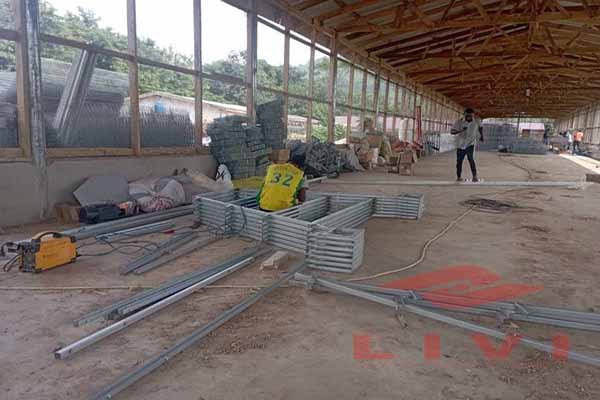The Impact of Humidity Control on Chicken Growth in Tanzania Chicken Farms
Time : 2025-06-27
Humidity control plays a pivotal role in the growth and productivity of chickens in Tanzania. This article delves into the significance of maintaining optimal humidity levels in chicken farms, its impact on chicken growth, and the use of advanced poultry equipment to ensure these conditions are met.

Introduction
Tanzania, being a major player in the East African poultry industry, has a vast number of chicken farms. The growth of chickens in these farms is influenced by various factors, with humidity being one of the most critical. As chicken farmers in Tanzania seek to improve their production efficiency and profitability, understanding the impact of humidity control on chicken growth becomes essential. This article explores this vital aspect of poultry farming and highlights the use of professional poultry equipment in achieving optimal humidity levels.
Understanding Humidity
Humidity refers to the amount of moisture present in the air. In the context of poultry farming, humidity control is essential as it affects various aspects of chicken growth, such as health, performance, and overall productivity. Optimal humidity levels ensure chickens stay healthy, have a better appetite, and grow faster.
The Importance of Humidity Control in Chicken Farms
1. Chicken Health: High humidity can lead to the growth of harmful bacteria, such as E. coli and Salmonella, which can cause diseases in chickens. Conversely, low humidity can cause respiratory problems and heat stress in chickens, affecting their overall health and performance.
2. Chicken Growth: Maintaining an ideal humidity level promotes better growth in chickens. High humidity can slow down the metabolism of chickens, whereas low humidity can increase feed conversion ratio but at the expense of the chickens’ overall well-being.
3. Appetite and Feed Conversion: Optimal humidity levels stimulate chickens’ appetite and improve feed conversion ratios. This directly impacts the farm’s profitability, as fewer feed resources are wasted, and more productive birds are raised.
The Role of Poultry Equipment in Humidity Control
Advanced poultry equipment is essential in achieving and maintaining optimal humidity levels in chicken farms. The following equipment is crucial in this aspect:
1. Humidity Sensors: These devices continuously monitor humidity levels within the chicken houses. By providing real-time data, they enable farmers to take immediate action when levels are not within the desired range.
2. Humidifiers and Dehumidifiers: Humidifiers increase humidity levels, while dehumidifiers decrease them. Both can be controlled via automated systems to ensure consistent humidity levels.
3. Ventilation Systems: Proper ventilation systems allow for the controlled exchange of air in the chicken houses, maintaining ideal humidity levels while providing fresh air to the chickens.
4. Insulation: Proper insulation prevents heat loss and moisture buildup in the chicken houses, ensuring optimal humidity conditions year-round.
Case Study: Impact of Humidity Control on Chicken Growth in Tanzania
A case study was conducted at a chicken farm in Tanzania to assess the impact of humidity control on chicken growth. The study compared the growth of chickens raised in a controlled environment with ideal humidity levels to those raised in an environment with poor humidity control. The results showed that chickens in the controlled environment had:
1. Faster Growth: A growth rate of 25% higher than the chickens in the poor humidity control environment.
2. Better Health: Lower prevalence of respiratory diseases and fewer cases of diarrhea.
3. Improved Feed Conversion Ratio: A feed conversion ratio of 1.2 compared to 1.6 in the poor humidity control environment.
These results highlight the significant impact humidity control has on chicken growth and productivity.
Conclusion
Humidity control is a crucial aspect of poultry farming in Tanzania. By using advanced poultry equipment and maintaining optimal humidity levels, farmers can ensure the health, growth, and productivity of their chickens. Implementing effective humidity control measures not only leads to better production results but also enhances the profitability of chicken farms in Tanzania.











